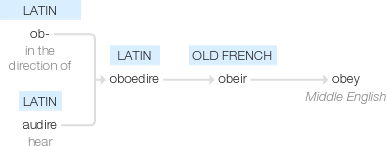Obey
Middle English: from Old French obeir, from Latin oboedire, from ob- ‘in the direction of’ + audire ‘hear’.
wiktionary
From Middle English obeyen, from Anglo-Norman obeir, obeier et al., Old French obeir, from Latin oboediō (also obēdiō(“to listen to, harken, usually in extended sense, obey, be subject to, serve”)), from ob-(“before, near”) + audiō(“to hear”). Compare audient. In Latin, ob + audire would have been expected to become Classical Latin *obūdiō (compare in + claudō becoming inclūdō), but it has been theorized that the usual law court associations of the word for obeying encouraged a false archaism from ū to oe, to oboediō (compare Old Latin oinos → Classical Latin ūnus). [1]
etymonline
obey (v.)
c. 1300, obeien, "carry out the commands of (someone); submit to (a command, rule, etc.); be ruled by," from Old French obeir "obey, be obedient, do one's duty" (12c.), from Latin obedire, oboedire "obey, be subject, serve; pay attention to, give ear," literally "listen to," from ob "to" (see ob-) + audire "listen, hear" (from PIE root *au- "to perceive"). Same sense development is in hiersumnian, the Old English word for the same thing. Related: Obeyed; obeying.
